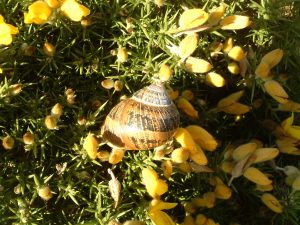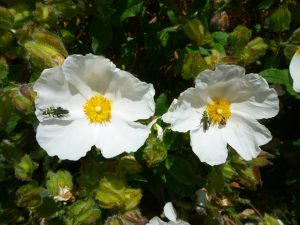As the Spring Equinox influences our daylight hours, thoughts and actions turn to gardening tasks; that don’t destroy nature’s tried and tested systems.
NATURE LOVERS?
We need to learn to love the slug
That leaves those shining silver trails
And are found in every garden corner
While we admire more adorable fauna
That look so cute with smiley eyes
And lovely fluffy wagging tails
And when we venture out of doors
To enjoy a Summer’s day
The myriad gnats that float and hover
Can be regarded as a bother
Unneeded in the scheme of things
But to the dragonfly, they’re prey
Those flies with allegedly grubby feet
That land where we don’t want them to
And regularly risk extermination
When we react with irritation
Are only clearing up our waste
That we’ve forgotten how to do
We’re so divorced from nature’s ways
We often only feel alarm
When spiders speed across the floor
Or beetles venture through the door
Invading humans private space
But not intending any harm
No apologies for repeating that poem; which was first published on the Blog on Post 29 (September 2022); and It’s (still) so apposite for the subject of this post.
I hear on the news that the RHS and the Wildlife Trust are pleading with gardeners to ‘spare the slug’; and snail of course. In the media language of today, our slimy friends are being given ‘a makeover’. The Wildlife Trust and the RHS want to challenge ‘negative perceptions’.
Under the title ‘Make friends with your Molluscs’ they point out that slugs, snails and so called ‘pests’ such as woodlice and other creepy crawlies are our friends, clearing up rotting vegetation, fungi and dung, and putting nitrogen, nutrients and minerals back into the soil. And, as an added bonus they are food for garden friendly predators; thrushes, blackbirds, ground beetles, frogs, toads and hedgehogs. All very laudable of course; but how long is it going to take for gardeners, and farmers, to take on the challenge of what is happening to our flora and fauna?
As I, and my hubby, get more and more unable to cope with the physical demands of ‘traditional’ gardening methods, digging, weeding, chopping, shearing and lopping (note the desire for a handy gardening robot in the last post!) the advantages of the ‘lazy’ methods of ‘new’ systems of horticulture have become ever more apparent.
No dig: We have practiced this method for about three years now. At the end of the harvesting season we roughly chop down any unwanted growth, and cover the ground with cardboard, or other suitable protection. When we need to plant the next season’s crop, we just have to remove the cover and plant our seedlings, spuds or seeds straight into the firm earth; thus disturbance of the soil structure is at a minimum; bolstering a fairly recent realization that digging disturbs the micro root structure of our soil. When we dig we break up the fungal network and expose microbes and other life forms to sunlight, which can kill them. Any green waste is then used as a mulch, to protect the new crop.
Minimum mowing: We have a relatively large area of grass that ‘needs’ to be kept in check. So we have followed the newly popular practice of leaving as much as is practicable to meadow; and just mowing necessary paths for access. The enjoyment of sitting and watching the insect and wildlife utilising those ‘weedy’ areas is a constant source of garden ‘mindfulness’.
All cutting back is chopped up and left on the ground, contributing to the build up of mulch; or put in the compost bin, where it encourages the build up of those red brandling worms; so efficient in turning rotting vegetation into friable compost. Large brash is piled up in various ‘waste’ areas of the garden, contributing to homes for garden friendly animals; and food for foragers. My favourite garden tool is a pair of long handled shears. I rarely have to pull up a ‘weed’; finding that even persistent and prolific growers (brambles, nettles etc.) have no defence against regular shearing; and are nutritionally beneficent to that mulch build up.
This mindset encourages realisation of the importance of the wildlife population. When gardening, we never, knowingly, kill any living creature. We don’t have to; because the birds keep our veg clear of ‘pests’, and the mulch cover provides plenty of alternative diet for same. To adapt a much used metaphor ‘to walk in others shoes’, imagine that you are a slug, roaming through a ‘tidy’ veg patch, devoid of weeds and cover. That slug has a clear path to those tempting seedlings you are hoping to grow on; and has no recourse to garden waste; which is their traditional fare.
Last year, some holidaymakers strolled through our garden. While passing our flowering Cistus, I pointed out the tiny iridescent green ‘fat kneed’ beetles that inhabited nearly every blossom. To my horror, one of the party automatically went to ‘squash’ the ‘pest’; and looked quite aggrieved when I stopped this mindless killing. Luckily I think most gardeners are realising that the chop, kill and poison methods, so beloved of our predecessors, are positively damaging to our environment.
All we need now is for our farmers to get on the same bandwagon as our clued up gardeners, and save our fields from further destruction of our soil health; which has been exacerbated by monoculture, herbicides, pesticides, and compaction.
And, be warned. This probably won’t be the last time, or post, that I’ll be bending your ears about ‘forward’ looking gardening practice!

It’s still a great little poem. I love the alliteration and the images.
Please don’.t apologise for repeating this vital message for all gardeners. As you say it has the advantage of saving so much work!
Some of the old guys on our allotment are still double digging but most people have moved to this method and seem happy with the amount of produce they achieve
I can affirm with 100% confidence that the delicious veg produced from your no-dig garden is out of this world. Compared to the disappointingly bland supermarket offering … well, there is no comparison!
Lovely poem! If only more people thought this way about gardening and nature.
My only hope is that it’s going to become more and more evident that Nature knows best!
I really can’t love the slug. When I had my garden in Whitton they used to devour my succulents over night.
I was most delighted if a hedgehog would visit
I love the idea of your forward gardening
I bet those succulents were weeded! A nice clear run for the discerning slug. And yes, they are very tasty for a foraging hedgehog. Sadly, we don’t seem to have many hedgehogs in this part of the world. Ah ‘Forward Gardening’ an apposite name for our style of horticulture; which has taken on the motto ‘Nature Knows Best’!